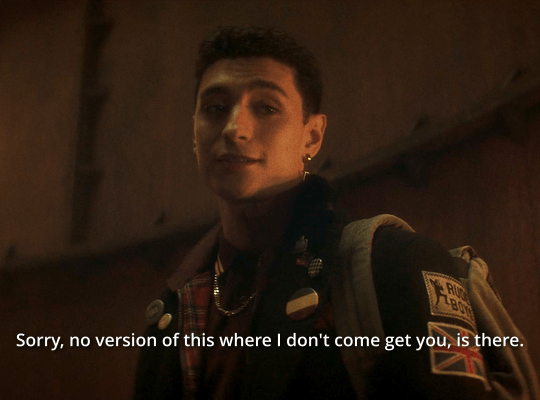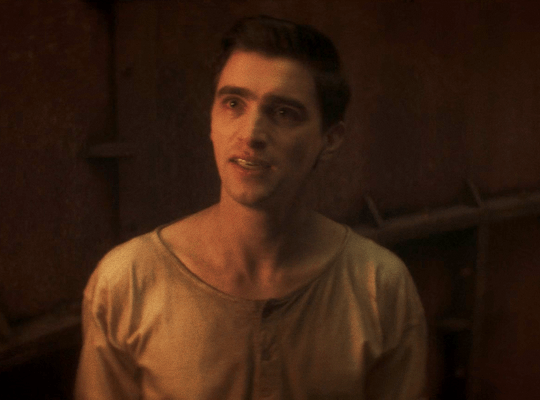#[s1e7] the case of the very long stairway
Explore tagged Tumblr posts
Text
I just had a realisation.
In the Payne/Rowland file the Night Nurse has, it says that Edwin died around noon (1:00 pm), and not at night, I mean, when the satanic ritual was performed. Does that mean that Saal took him to hell alive?
There was no blood covering his face when he took him, but Edwin tells Charles "this is the last me" when he asks about it. So are you telling me he died in hell?
His disappearance was label an act from God, that means he was gone, they never found a body, probably his grave is empty (?). The demon he was sacrificed to, took him to hell and he died there, being torture, and it wasn't fast.
And... that was the last him?
#screaming crying throwing up#edwin payne#charles rowland#dead boy detectives#dead boy detective netflix#dead boy detective agency#dbda#dbda meta#paineland#painland#payneland#edwin paine#dead boy detectives agency#dead boy detectives meta#chedwin#notebook entry#[s1e1] the case of crystal palace#[s1e7] the case of the very long stairway
388 notes
·
View notes
Text
Dictionnaire Infernal
illustration of Bael by Louis Le Breton
Author: Jacques Collin de Plancy
Year: 1818

The page Simon put their initials on has a spider, cat, king, frog?
#the nun that recommended me that book is not happy with the way I'm using that knowledge#dead boy detectives#dead boy detectives meta#edwin payne#simon#[s1e7] the case of the very long stairway
109 notes
·
View notes
Text


Dead Boy Detectives
S1E7 | The Case of the Very Long Stairway
for the @charles-rowland-week prompt alive
#dead boy detectives#dbda#charles rowland#gif warning#dbda gifs#mygifs#blood cw#not much but i'd rather tag just in case#charles rowland week
292 notes
·
View notes
Text

Dead Boy Detectives // S1E7 - The Case of the Very Long Stairway
53 notes
·
View notes
Note
Do you have any pictures of Edwin’s notebook/pages about hell? I’m trying to recreate it and it would be greatly appreciated!!
Hi!
I have these:









Also, if it helps, here's the Payne coat of arms:

(I'll leave it to tumblr to ruin the definition)
#the main graphic of hell is already posted under the next tag#object: edwin's notebook#edwin payne#edwin paine#dead boy detectives#anon 👻#dbda#answered 💌#[s1e7] the case of the very long stairway
90 notes
·
View notes
Text
I'm still thinking about Death's words in Episode 1, and the way I think she was not just talking to Wilfred (the soldier), but indirectly, she was talking to Edwin and Charles too.
Let me explain...
"You've been fighting old battles for too long (...) you died over a hundred years ago"
"I came for you then, but you were so confused, so filled with anger and with hate, you seem a lot better now"
I wonder if they overheard her, if that's even possible, or if it was something purely directed to us, as an audience.
It just makes me think quite a lot, because her words were so on point for the way the boys' arc was going to develop. In one side, Edwin fighting against his own mindset in order to face his own identity and his feelings, and then Charles, facing his trauma, and the frustration and anger that he had been carrying since he died.
Oh, and then there's the poem:
They will come back - come back again, as long as the red Earth rolls.
He never wasted a leaf or a tree. Do you think He would squander souls?
[Source: The Sack of the Gods, Rudyard Kipling]
This is not the whole version, only the last verse that Death recites in that scene. I would like to mention the story behind it too, because I find the connections curious.
The Kipling Society refers that this poem—most probably—was written as a form of celebration, "in lofty cosmic terms" of Kipling’s partnership with his friend Wolcott Balestier, who died unexpectedly in December 1891.
Together, it passionately asserts, the two young comrades had fought to conquer the heights, an endeavour which seems long ago now that Wolcott is dead.
[Source: The Sack of the Gods – Background (notes by Jan Montefiore and John Radcliffe)]
Also, about the lofty cosmic terms, these are found in the following verses of the poem:
Under the stars beyond our stars where the new-forged meteors glow,
(...)
Dust of the stars was under our feet, glitter of stars above—
Wrecks of our wrath dropped reeling down as we fought and we spurned and we strove.
Worlds upon worlds we tossed aside, and scattered them to and fro.
I don't know if the connection between the poem and the song that plays in the background of Charles' memories in Episode 7, was intentional or no.
And it's something quite peculiar,
Something shimmering and white
It leads you here, despite your destination,
Under the Milky Way tonight.
[Source: Under The Milky Way - The Church]
But I think is beautiful, if you take into account that the meaning of that poem revolves around the idea of deja-vu, "hearking back to an experience in an earlier life, based on reincarnation"; and that there's always that possibility.
Is this something? Am I even making sense?
#[s1e7] the case of the very long stairway#[s1e1] the case of crystal palace#death of the endless#dead boy detectives#dead boy detectives meta#edwin payne#charles rowland#edwin paine#paineland#payneland#painland#paynland#chedwin#dead boy detective netflix#dead boy detectives agency#dead boy detective agency#dbda#meta#notebook entry
78 notes
·
View notes
Text



Dead Boy Detectives
S1E7 | The Case of the Very Long Stairway
For Day 1 of Character Appreciation Week!
#dead boy detectives#dbda#gif warning#edwin payne#charles rowland#dbda gifs#mygifs#DBDA Character Appreciation Week#save dead boy detectives
263 notes
·
View notes
Text


Dead Boy Detectives
S1E7 | The Case of the Very Long Stairway
for the @charles-rowland-week prompt alive
#dead boy detectives#dbda#edwin payne#charles rowland#gif warning#dbda gifs#mygifs#charles rowland week
269 notes
·
View notes